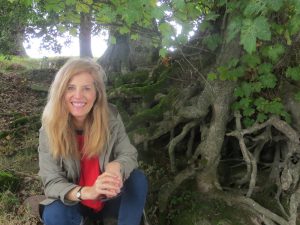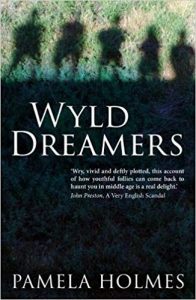Why I Ended Up Writing What I Knew
 They say a writer writes best about what they know, and I have followed this dictum in my second novel, Wyld Dreamers. It’s broadly based on the years I lived in the English countryside in the 1970s. Milking cows, baking bread and hay-making, I fell in love with it all and became what some people called a hippy. I lived on a rural farm for around three years and assumed I would be there for the rest of my days with my friends and animals.
They say a writer writes best about what they know, and I have followed this dictum in my second novel, Wyld Dreamers. It’s broadly based on the years I lived in the English countryside in the 1970s. Milking cows, baking bread and hay-making, I fell in love with it all and became what some people called a hippy. I lived on a rural farm for around three years and assumed I would be there for the rest of my days with my friends and animals.
I include these experiences in my coming of age tale, though all the characters in Wyld Dreamers are fictitious. A group of friends is asked by successful London photographer Seymour Stratton to help his son and their university pal Julian to renovate a dilapidated cottage on Seymour’s Somerset smallholding.
The offer is irresistible. A beautiful house, an isolated setting, constant parties, drinking and drugs. The five friends live, try to work and often play together, with the inevitable ups and downs of communal living. Commitments and plans are shelved in favour of living in a glorious present.
Over the next eighteen months, fantasies that the idyll will last forever are entertained. The group regards the farm as a place where they might live forever. But when relationships start to fray and there’s an episode involving the police, Seymour kicks them off the farm. The friends scatter to pursue more conventional lives and Wyld farm becomes a place they think about from time to time but imagine they will never return to again.
When I was a hippy, I lived in Somerset. I couldn’t resist making this county a star of my book. Somerset is best known as the site of Exmoor National Park. Fewer people are familiar with the surrounding area they pass on the way to the moor, the dramatic hills of red-brown soil, the plunging combes, tiny twisting lanes and hidden hamlets are only a blur from the car window. In Wyld Dreamers, the landscape is more than an evocative setting for drug-fuelled walks and wild parties, it is an ally for one of the book’s characters.
Eighteen-year old Amy, whose mother dies suddenly when Amy first goes to the farm, finds solace when she wanders the high ridges. The beech trees, planted to shelter livestock from winter winds, provide comfort to the broken-hearted girl. The ancient ‘hollow ways’ are peaceful places where she can recuperate, especially when her friends seem unable to help her.
I’m drawing on personal experience. My mother died when I was 16. I could see my friends didn’t know what to do or say to me; the silences were awkward, their glances shifty. It’s not surprising, perhaps. Many of us, even when we’re what could be described as ‘grown up’, find it hard to talk about death. That’s when I discovered that the meaning in the phrase the ‘healing power of nature’.
The words may sound trite but the benefit of being with plants and close to animals is undeniable. That’s my experience anyway. One afternoon about six months after my mother died, when the feelings of loss were still overwhelming, I managed to drag myself into the forest for a walk. Breaking through a thicket of trees, I came across a glade, a patch of dry ground, warm in the sun.
Sitting on a hillock, boots off, toes digging into the grass, the sun’s rays on my shoulders, a moment of peace descended. Watching the clouds bowl over the tree tops hill on the other side of the valley, in physical contact with the earth, dwarfed by the massive sky above, my pain calmed. I was insignificant in the greater cycle of nature. And for those brief tranquil moments, I felt held and at peace.
Writing Wyld Dreamers gave me a fascinating peer back into the past to see where things have changed. The book is set in the 1970s, a decade we often regard as a dull as it follows on from the wild Swinging Sixties. But I’d say it makes more sense to see the 70s as the exciting beginning of a new chapter in the story of Britain. It’s when there was a focus on feminism, action on animal rights and the beginning of the modern environmental movement.
There were freer fashion choices – think bellbottoms and platform boots – and by 1974, the contraceptive pill could be prescribed to single women. Many things that we now accept as normal were radical and controversial. So when I bring the five friends back together 25 years after they’ve been driven off Wyld Farm, we see how they’ve adapted to changing times and what their dreams are made of now.
I’m fascinated by the power of secrets, too and writing this book gave me the opportunity to explore their influence. Who knows ‘what’ and ‘when’ they know it is vital. Information that’s withheld, hidden from friends and kept from spouses, can exert an extraordinary influence over people and events. It’s impossible to predict what will happen when secrets are finally revealed though the impact can be far-reaching. It’s certainly the case in my book. You could say Wyld Dreamers is a serious book about the unintended consequences of having fun.
For me, writing is a reflective process that I start to understand once it’s concluded and the book is in my hands. In the middle of writing, I’m a bystander to the lives of the characters and the action. Only when it’s on the page, do I appreciate what it is that I’ve been trying to articulate and to express from the deepest part of my being. And that is that the power of place is inescapable. The importance of surroundings and nature to help us connect and manage wild feelings and emotions.
—
Pamela Holmes was born in Charleston, South Carolina. At the age of eight, she moved with her family to England. She studied nursing at London University as a mature student having spent three years living on a commune in Somerset where she developed a love of gardening, milking cows and laying hedges. She became a health journalist and on-screen reporter. She now works and volunteers to improve the lives of older people including those with dementia, and she sings in a rock band. The Huntingfield Paintress is her first novel. Her entry for the HISSAC short story competition 2015 was Highly Recommended and she won the Jane Austen Short Story Award 2014. Pamela is the mother of two boys and lives in London with her husband.
About WYLD DREAMERS
I n the summer of 1972, a group of friends is invited to Somerset to help photographer Seymour Stratton renovate a dilapidated cottage on Wyld Farm. Over the next year the group come to regard the farm as offering them a place to be for the rest of their lives, to enjoy ‘the good life’. But despite the commitment and camaraderie the rural idyll collapses.
n the summer of 1972, a group of friends is invited to Somerset to help photographer Seymour Stratton renovate a dilapidated cottage on Wyld Farm. Over the next year the group come to regard the farm as offering them a place to be for the rest of their lives, to enjoy ‘the good life’. But despite the commitment and camaraderie the rural idyll collapses.
Twenty-five years later, the group is brought together again in unexpected circumstances. Can events of the past be forgotten? Or will the secrets that are revealed devastate once unbreakable friendships?
Category: Contemporary Women Writers, How To and Tips
























